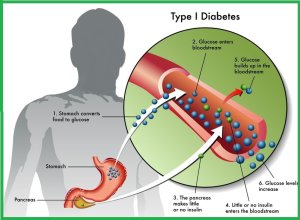Menu
- AyurVAID Shop

Type 1 Diabetes affects the body such that it can no longer produce diabetes controlling hormone. Often referred to as juvenile diabetes, Type 1 Diabetes is a form of Diabetes Mellitus that is most common in children but can be diagnosed at any age.
Type 1 Diabetes is an autoimmune disease that permanently destroys beta cells in the pancreas, meaning that the body can no longer produce the hormone. People with Type 1 Diabetes therefore require regular diabetes controlling hormone delivery to manage their diabetes.
The causes of Type 1 Diabetes are different from those for Type 2 Diabetes, though the exact mechanisms for development of both diseases are unknown. Type 1 Diabetes is commonly thought to be caused by a combination of genetic predisposition and an environmental trigger, which causes the immune system to target and kill off its own hormone producing cells. What triggers the immune system to behave this way is not yet well understood. Theories include the possibility that a virus may stimulate the auto-immune response. As more hormone producing cells in the pancreas are killed off, the body can no longer control its blood glucose levels and the symptoms of diabetes begin to appear.
Type 1 Diabetes Symptoms should be acted upon immediately, as without treatment this type of Diabetes can be severe.
Symptoms include:
Sometimes,Type 1 Diabetics may be mis-diagnosed as being Type 2, particularly if the condition develops later in life.
Type 1 Diabetes can also lead to complications including:
Whilst the list of complications is a scary prospect, the chances of developing these can be significantly reduced by maintaining good control of your blood glucose levels and ensuring you attend all your diabetic complication screening appointments.
Lack of diabetes controlling hormone production by the pancreas makes Type 1 Diabetes particularly difficult to control. Treatment requires a strict regimen that typically includes a carefully calculated diet, planned physical activity, home blood glucose testing several times a day, and multiple daily hormone injections. Staying physically active and exercising regularly, maintaining a constant weight and eating a healthy diet are all invaluable in Type 1 Diabetes Treatment [Panchakarma Therapy]. Although diet and exercise have a role to play in Type 1 Diabetes management, they cannot reverse the disease or eliminate the need for diabetes controlling hormone. There is also a sub-type of Type 1 Diabetes known as brittle Diabetes.
With Ayurveda’s root-cause focus, Apollo AyurVAID simultaneously treats the symptoms and the underlying cause of Diabetes Mellitus, commonly referred to as Diabetes, naturally, with the help of safe and time-tested processes. Apollo AyurVAID treats Diabetes & Diabetes Complications through Panchakarma and other classical Type 1 Diabetes Ayurvedic treatment and medicines, transformed into time bound personalized treatment plans. Apollo AyurVAID reverses Pre-Diabetes and provides validated outcomes through our Type 1 Diabetes Ayurvedic Treatment and Diabetes Type 2 treatment programs, apart from preventing Diabetes Complications including Glaucoma, Retinopathy, Diabetic Foot, Diabetic Neuropathy and Non-Healing wounds based on precision application of Ayurveda principles and processes.
Our Ayurveda regime, rather than just handle the Diabetes symptoms, reduces resistance and ensures effective utilization of glucose, making sure that the sugar levels in the body is in optimum balance and cardio-metabolic risk factors are alleviated. This Apollo AyurVAID approach is followed by our hospitals in Bangalore (Karnataka), Kochi (Ernakulam, Kerala) and Kalmatia in Himalayas (Almora, Uttarakhand) in India also enables treatment of Hypoglycemia and Diabetic Neuropathy treatments, as the microvascular complication of diabetes is what leads to problems with the eyes (retinopathy or cataracts), kidneys (nephropathy), and nerves (neuropathy).
*Outcome may vary from patient to patient
Bengaluru – Domlur Bengaluru – Aster CMI, Hebbal Bengaluru – HRBR Layout Bengaluru – Sri Shankara, Basavangudi Bengaluru – Bannerghatta Road Bengaluru – ArekereDelhi – New DelhiKochi – Kadavanthara Uttarakhand-Kalmatia, AlmoraChennai – Greams Road Chennai – Vanagaram Chennai – Kotturpuram Hyderabad – Somajiguda
Ayurveda Parasurgery Autoimmune Disorders Blood Disorders Cardiology Dermatology Endocrinology Ear-Nose Throat-Mouth Elder-Care Gastrointestinal Gynaecology Integrative Oncology Infectious-Diseases Liver-Hepato-Biliary-Care Mental Health and De-addiction Male-Reproductive-Disorders Nephrology Neurological-Disorders Orthopaedic Disorders Ophthalmology Obstetrics-Integrative Preventive-Health-Wellbeing Pulmonology Pediatric-Development-Disorder Sleep-Disorders
Any use of this site constitutes your agreement to the Terms and Conditions, Privacy Policy and Cancellation and Refund Policy
©2025 Apollo AyurVAID Hospitals. All rights reserved.
Popular Searches: DiseasesTreatmentsDoctorsHospitalsWhole person careRefer a patientInsurance